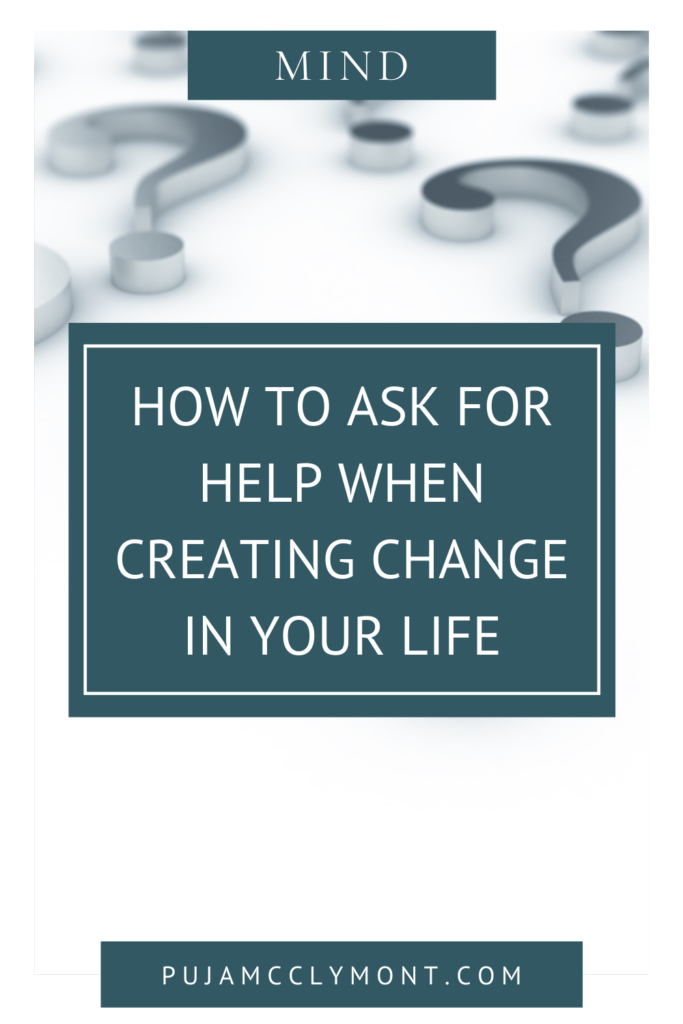
How to ask for help when you’re creating change in your life
Asking for help when you’re creating change in your life is one of the most difficult things you can do.
But it’s also one of the most important.
If you’re trying to make a change in your life, whether that’s changing careers or starting a business, there are going to be times when you feel scared and alone. You might feel like no one understands what you’re going through and no one can help you.
But here’s a little secret: we’ve all been there. We’ve all felt that way—and we all know how hard it is to ask for help when we need it most.
So here are four tips for asking for help when you’re creating change in your life:
4 Tips for asking for help:
1. Make a list of who you know
Make it easy on yourself by making a list of people who are willing to listen and offer advice. When you want to make changes in your life, you will need a strong community of support behind you. This could include friends, family members, therapists or coaches who have successfully helped others make changes in their lives. If this sounds daunting, start small by asking a friend if they’d be willing to walk through something with you—maybe even just over coffee.
2. Be clear on boundaries
Make sure the person you ask is someone who has your best interests at heart and will respect the boundaries that you set up around the situation (e.g., if they can help with one thing but not another). It’s easy to get excited about making changes in your life and getting support to make it happen but remember to create boundaries for both you and anyone who helps you. When you are clear about these boundaries, it’s less likely that either party will feel resentment at any stage. Know that you’re cultivating a relationships based on the changes in your life and that everyone needs to be respected. Self-awareness will be your friend at this stage of the journey.
3. Be open and honest
If it makes sense, share why this is important to YOU—not just what other people say about it being important—and how this will affect YOU emotionally and physically. People are quick to say “I’m happy to help” but then don’t make it clear how they actually do this. For some people, support is conditional “I’ll scratch your back if you scratch mine.” Other people offer support but then don’t set clear boundaries of how they will do this and then don’t communicate. So when you’re at a point of making changes in your life, you hit up the person who offered support, they are unable to give it or they create new parameters.
When you are open and honest about how this support will help you make changes in your life, you allow the other person to understand how important these changes are and this often leads to better support from them.
4. Be respectful
Being respectful of their time should be your top priority. Don’t make them feel like they should drop everything else they’re doing just because they said they would help! Think about how you would feel if someone asked for your help. Would you appreciate demands on your time? Also be very clear about the kind of support you need from brainstorming ideas through to accountability. Remember it’s you who is creating change in your life so perhaps evaluating your own emotional intelligence will be a welcome growth opportunity during the asking process too.
Creating change in your life and asking for help
When you’re trying to create change in your life, it can be hard to ask for help. You may feel like you’re not worthy of it, or that you should be able to do everything on your own. You might also worry that people will judge you for asking for help in the first place.
But here’s the thing: asking for help is a sign of strength. It’s a sign that you know what you need and are willing to put yourself out there in order to get it.
The first step is acknowledging that asking for help doesn’t mean you’re weak—and it certainly doesn’t mean that anyone else has power over you or your life. When we ask for help from others, we are simply allowing ourselves to open up and be vulnerable with someone else in order to get what we need.
So next time you find yourself wanting to ask someone for assistance with a goal or project, try this one tip: be specific about what exactly will happen when they do agree to help (i.e., “if I finish [project], then [result].”). This will make it easier for them to understand where their contribution fits into the bigger picture of helping you create change in your life. This means they’ll have less chance of getting lost or overwhelmed by all the different things they have to do.
Creating change in your life


I’m Puja. I’m a Life Coach on a mission to empower individuals to achieve optimal well-being.
I believe that personal growth sparks global change by creating a ripple effect that helps us thrive together.
In my work, I use a powerful blend of techniques from ancient wisdom and modern psychology to help individuals lead balanced, successful and fulfilling lives.
Thank you!
You have successfully joined our subscriber list.
CLARITY COMPASS
The Clarity Compass is designed to help high-achievers gain a clear sense of direction in both their personal and work life.
Plus it includes tips to optimise well-being and prevent burnout in the pursuit of fulfilment.
FREE RESOURCE
Thank you!
You have successfully joined our subscriber list.
CLARITY COMPASS
The Clarity Compass is designed to help high-achievers gain a clear sense of direction in both their personal and work life.
Plus it includes tips to optimise well-being and prevent burnout in the pursuit of fulfilment.
FREE RESOURCE
Registered address: 3rd Floor, 86-90 Paul Street, London, EC2A 4NE
© 2024 Frankly Coaching Ltd.